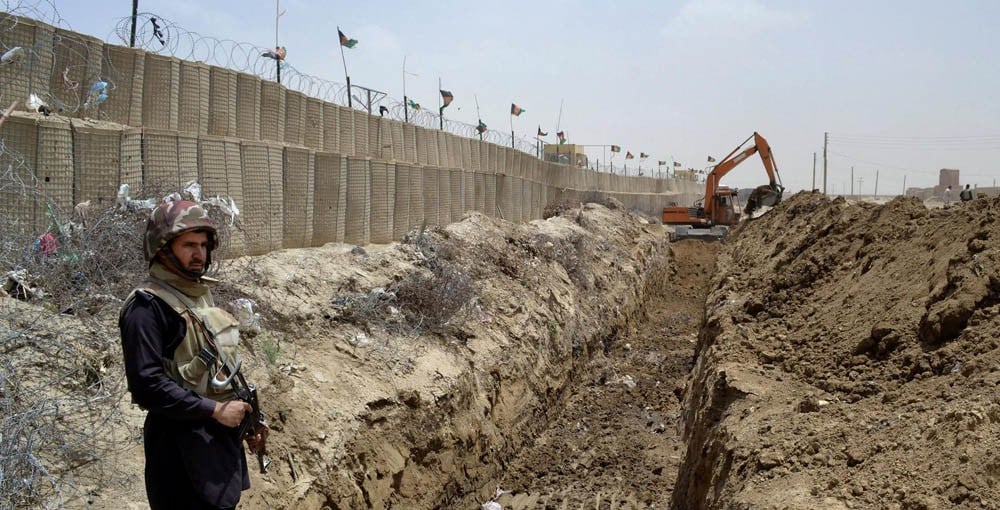
10-feet deep and eight-feet wide trench along the Durand Line is crucial to counter an existential threat to the very survival of the state and its societal solidarity

Continuous militant and terrorist attacks on Pakistani soil, most of which originated from Afghanistan, resulted in increasing cries to secure the border with Afghanistan. There have been slogans for fencing and mining of the entire length of the Durand Line. Former military ruler General Musharraf even offered to do so but serious objections were raised by Kabul.
However, of late there have been reports that Pakistan has completed digging a 480-kilometre long trench, which is 10-feet deep and eight feet wide, along the Durand Line six kilometres inside its territory. Keeping in view the historical issue of management of the Durand Line and the resultant multifarious security, socioeconomic and political issues in Pakistan, the digging of the trench is of extreme significance. It is crucial to secure the country’s borders at a time when there is an existential threat to the very survival of the state and its societal solidarity.
Having said this, it must be mentioned that digging of just 480 kilometres long trench along Pakistan’s 2460 long border with Afghanistan would not secure the border and end the ongoing militancy. Nevertheless, a good start has been taken. Pakistan would have to dig more such trenches to secure the border as well as erect fences where trenches could not be laid. This would have to be topped with more security checkpoints, surveillance towers and airborne observation.
Since the birth of Pakistan in 1947, the country has faced the complex problem of securing its borders either due to their extensive length or the mountainous and extremely rough and remote terrain through which they pass. In particular, at Pakistan’s border with Afghanistan, known since 1893 as the Durand Line, security and management has been a continuous problem.
The Durand Line also happens to be the longest international border of Pakistan. The foremost reason of Pakistan’s inability to properly manage its border with Afghanistan is the extremely difficult terrain, which this border traverses. Most of the border passes through near-desert like territory in Balochistan and from medium to high altitude mostly inaccessible mountains in the Federally Administered Tribal Areas (FATA) and the Khyber Pakhtunkhwa province. The length of the Durand Line is around 2460 kilometres.
The tough terrain around the Durand Line forced successive Pakistani governments not to deploy regular military forces on the border. This helped the local residents of Afghanistan and Pakistan to cross at will and conduct whatever good or bad activities they wanted on the other country’s territory. This included infiltration of militants and terrorists, and smuggling of arms and ammunition and other contraband.
Although Pakistan could not properly manage its border with Afghanistan, it has been keeping a strict vigil to whatever extent possible to check the inflow of aliens and contrabands from Afghanistan. This worked well until late 1970s. But after erstwhile Soviet Union’s forces occupation of Afghanistan in December 1979 and the resultant descending of millions of Afghan refugees on Pakistan, conditions got increasingly worse in Pakistan, particularly in the border provinces and regions.
Securing the border is of great significance for the entire Af-Pak region. The harsh reaction of Afghan officials to the digging of the trench is totally unjustified.
Gen Abdul Raziq, the police chief of Afghanistan’s Kandahar province reportedly stated, "The people here have never accepted the Pakistan-Afghanistan border in the first place… This trench is simply to draw a border with Afghanistan and claim our land as their own." Former Afghan Tribal and Border Affairs Minister, Akram Akhbelwak, said "This can never be acceptable for the Afghans. The trench and the tribal border are completely illegal. Such actions on the border are creating problems among the tribes and will never be a solution to the problems between the two countries."
In fact, an insecure border and Afghanistan irredentist claims on Pakistani territory, as evident from the above words of the Afghan officials, have been a source of all problems between the two countries. Borders between countries cannot exactly delineate or separate ethnic groups and tribes and history of modern nation-states is testimony to this fact. Rather, the very definition of a nation-state means that whosoever lives within geographical boundaries of a territory constitute one nation.